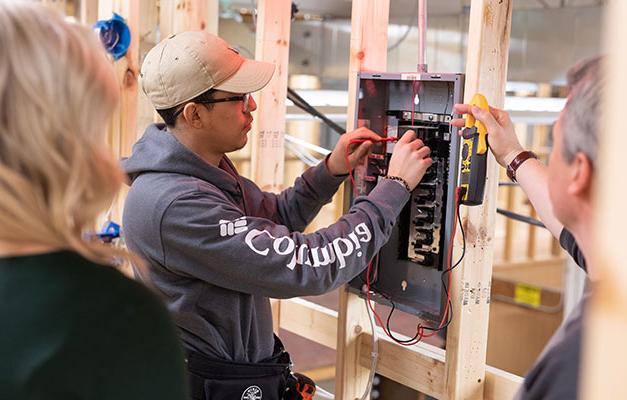
100% job placement

High demand compared to other careers in Minnesota

Hands-on training from industry experts
Potential Jobs:
- Electrician
Salary Information:
Median Wage: $31.81 per hour
Top Earners: $49.69 per hour
Information provided is for Minnesota. See current data at careerwise.minnstate.edu.
Program Details
The Anoka Technical College Construction Electrician diploma is an 82-credit program designed to develop skills in the installation and testing of electrical fixtures. Students will study wiring, including blueprint reading, wiring code, electrical theory and wiring laboratory. Many graduates of this program join unions to complete their apprenticeship training.
- Work safely amongst others.
- Troubleshoot electrical circuits using proper technique.
- Design and install single family dwelling circuits to NEC standards.
- Design and install commercial and industry circuits to NEC standards.
- Design and install control circuits to NEC standards.
- Effectively follow verbal and written instructions.
- Identify code articles that pertain to the project.
Construction electricians work with electrical materials on construction and remodeling jobs.
More specifically, construction electricians plan, assemble, install and test electrical fixtures, apparatus and wiring that is used in both new and existing buildings.
Construction electricians must have a complete knowledge of electrical codes, theory, and materials in order to correctly install and troubleshoot all types of electrical equipment and controls as required for each type of building.
Wage information is available from the Minnesota Department of Education and the Minnesota Department of Employment and Economic Development.
Take a self-guided virtual tour of our campus to see what it's like to be a student at Anoka Tech. View program labs, common student spaces, campus offices and more.
The Construction Electrician Program is approved by the State Board of Electricity, the Twin Cities Joint Apprenticeship Committee, and many unions in the upper Midwest, including: Local 110 (St. Paul), Local 292 (Minneapolis), Local 343 (Mankato), Local 242 (Duluth), Local 294 (Bemidji and Iron Range), Local 1426 (Fargo, East Grand Forks and Grand Forks), and Local 426 (Sioux City, Sioux Falls, Colorado and Kansas).
| Fall Semester | 19 | |
|---|---|---|
| ELEC 1002 | Electrical Theory I | 6 |
| ELEC 1021 | Residential Wiring Lab I | 5 |
| ELEC 1031 | National Code | 3 |
| MATH 1400 | Algebra and Trigonometry | 5 |
| Spring Semester | 18 | |
| ELEC 1062 | Electrical Theory II | 6 |
| ELEC 1081 | Residential Wiring Lab II | 6 |
| ELEC 1091 | National Electrical Code II | 3 |
| ELEC 1121 | Electrical Heating and Air Conditioning | 3 |
| Summer Semester | 8 | |
| ELEC 1101 | Power Limited | 2 |
| ELEC 1110 | Lighting | 2 |
| ELEC 1130 | Plan Reading | 2 |
| ELEC 1142 | Safety Principles/OSHA | 2 |
| Fall Semester | 19 | |
| ELEC 2011 | Commercial Wiring Lab I | 5 |
| ELEC 2021 | Motors and Controls I | 2 |
| ELEC 2031 | National Electrical Code III | 3 |
| ELEC 2041 | Three-Phase Electrical Theory | 5 |
| ENGL 1107 | Composition I (Goal 1&2) | 4 |
| Spring Semester | 18 | |
| ELEC 1108 | PLC's for Electricians | 3 |
| ELEC 2061 | Commercial Wiring Lab II | 6 |
| ELEC 2072 | Motors and Controls II | 3 |
| ELEC 2081 | National Electrical Code IV | 3 |
| SPCH 1200 | Interpersonal Communications (Goal 1&7) | 3 |
Students must earn a cumulative 2.0 GPA or higher to be eligible for graduation from this program.
Faculty
Current Students
Students must earn a cumulative 2.0 GPA or higher to be eligible for graduation from this program.
The U.S. Department of Education (USDE) has identified the program curriculum as meeting the state education requirements for licensure reciprocity agreements between Minnesota and the states listed below. Therefore, if a student becomes licensed in Minnesota, they can become licensed in those states identified. Additional requirements may exist and include fees, applications or other state specific exams. For those programs where no determination has been made, additional research will need to be completed to make those determinations: http://www.electricianschooledu.org/state-by-state-licensing-guide/.
For questions, please contact Brian Schelkoph
For those states where the USDE identified the program curriculum as meeting the state education requirements for licensure reciprocity agreements between Minnesota and theses states. Therefore, if a student becomes licensed in Minnesota they can become licensed in those states identified (http://www.dli.mn.gov/workers/electrician-or-electrical-installer/electrical-license-reciprocity). Additional requirements may exist and include fees, applications or other state specific exams. For those programs where no determination has been made additional research will need to be completed to make those determinations: (See individual state requirements)
List of states where the program curriculum meets state educational requirements for licensure or certification: Alaska, Arkansas, Colorado, Iowa, Minnesota, Montana, Nebraska, North Dakota, South Dakota and Wyoming.
List of states where the institution has not made a determination: Alabama, Arizona, California, Connecticut, Delaware, Florida, Georgia, Hawaii, Idaho, Indiana, Illinois, Kansas, Kentucky, Louisiana, Maine, Maryland, Massachusetts, Michigan, Missouri, Mississippi, Nevada, New Hampshire, New Jersey, New Mexico, New York, North Carolina, Ohio, Oklahoma, Oregon, Pennsylvania, Puerto Rico, Rhode Island, South Carolina, Tennessee, Texas, Utah, Vermont, Virginia, Washington, West Virginia and Wisconsin.
Start Dates:
Fall semseter: August
Important Dates:
Brian Schelkoph
BSchelkoph@expoconstruccionyucatan.com
Enrollment Services
EnrollmentServices@expoconstruccionyucatan.com
763-576-7710









